Don’t let hackers steal your profits: 10 Magento security tips to keep your store safe
In today’s digital world, every website is vulnerable to hackers. That’s why it’s so important to take steps to secure your Magento store, especially if you’re processing sensitive customer data like credit card numbers and addresses.
In this blog post, we’ll share 10 Magento security tips to help you keep your store safe from attack. These tips are easy to implement and can help protect your store from a wide range of threats.
Let’s get started!
Tip 1: Keep Your Magento Platform Updated: Magento Security Tips
Keeping your Magento platform updated to the latest version is one of the most important things you can do to secure your store.
Magento releases regular updates that include security patches and improvements to help protect your store from known vulnerabilities.
Recent Magento store security updates have included security enhancements to protect against SQL injection, XSS, and brute force attacks. They have also fixed bugs that could have been exploited by attackers.
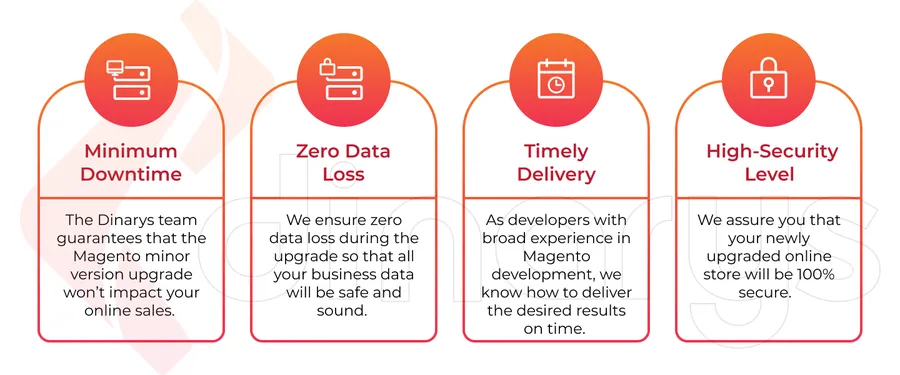
To update Magento, follow these steps:
- Back up your store files and database.
- Download the latest Magento version from the Magento website.
- Extract the Magento files to your server.
- Follow the Magento installation instructions to update your store.
Tip 2: Use Strong and Unique Passwords: Magento Security Tips
Strong and unique passwords are essential for protecting your Magento store. It’s one of the Magento security tips you should follow. Admin passwords, customer passwords, and database passwords should all be strong and unique.
A strong password is at least 12 characters long and includes a mix of upper and lowercase letters, numbers, and symbols.
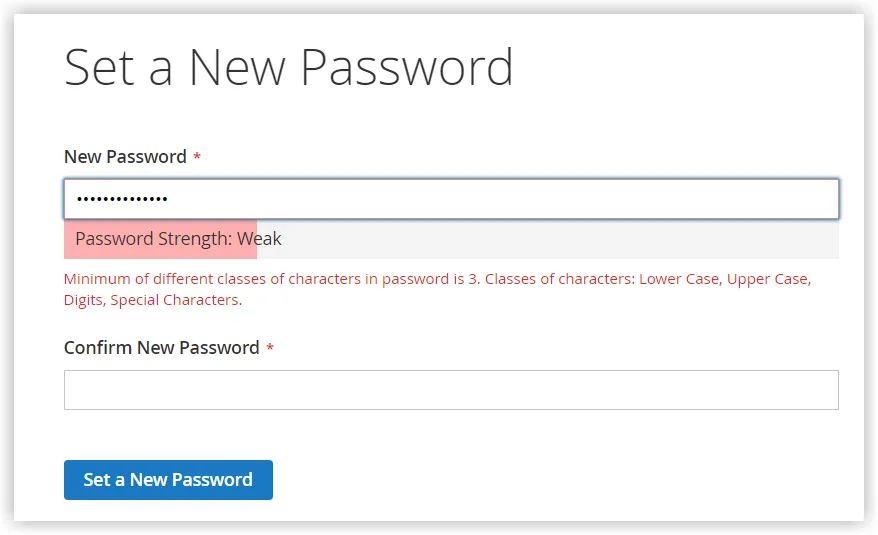
Avoid using easily guessable words or phrases, such as your name, birthday, or common passwords.
It is also important to use unique passwords for different accounts. If you use the same password for multiple accounts, an attacker who compromises one account will have access to all of your accounts.
To create strong and unique passwords, you can use password manager software. Password manager software generates and stores strong, unique passwords for all of your accounts.
Tip 3: Enable Two-Factor Authentication (2FA): Magento Security Tips
Two-factor authentication (2FA) adds an extra layer of security to your Magento store by requiring users to enter a code from their phone in addition to their password when logging in.
This makes it much more difficult for attackers to gain access to your store, even if they have stolen your password.
To enable 2FA in Magento for a secure Magento website, follow these steps:
- Go to Stores > Configuration.
- Under Security, select 2FA.
- Expand the General section and set Enable Two Factor Auth to Yes.
- Select the authentication methods that you want to use for 2FA.
- Click Save Config.
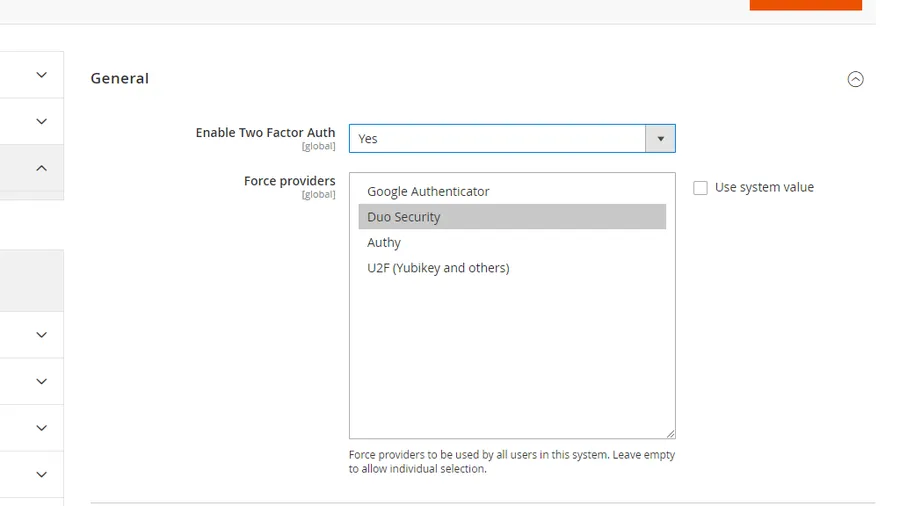
Once 2FA is enabled, users will be prompted to enter a code from their phone when logging in to Magento.
2FA provides several benefits for Magento store owners, including:
- Reduced risk of unauthorized access: 2FA makes it much more difficult for attackers to gain access to your store, even if they have stolen your password.
- Increased customer trust: Customers are more likely to shop at stores that use 2FA, as they know that their accounts are more secure.
- Compliance with regulations: Many regulations, such as PCI DSS, require businesses to use 2FA for certain types of accounts.
Tip 4: Secure Your Hosting Environment: Magento Security Tips
Choosing a reliable and secure hosting provider is important for the Magento security tips for protecting your Magento store. Your hosting provider should offer features such as:
- Secure server environment: Your hosting provider’s servers should be housed in a secure data center with physical security measures in place.
- Regular security updates: Your hosting provider should regularly update their servers with the latest security patches.
- Firewalls: Your hosting provider should use firewalls to protect your server from unauthorized access.
- Intrusion detection and prevention systems (IDS/IPS): IDSs/IPS monitor your server for suspicious activity and can block attacks before they cause damage.
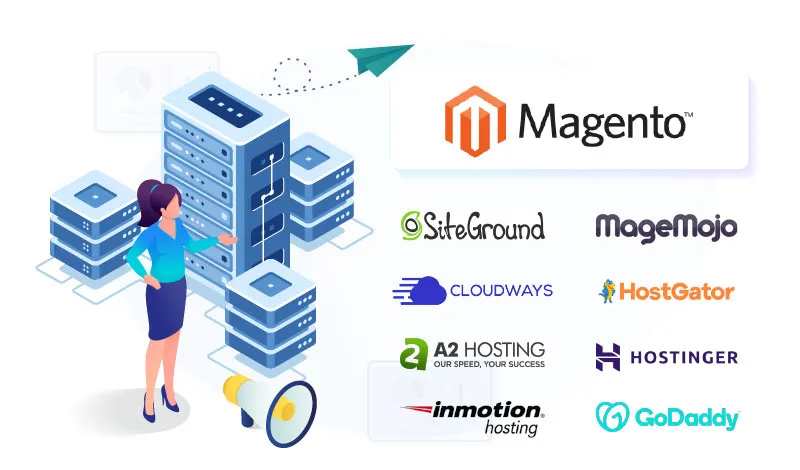
In addition to choosing a reliable Magento hosting provider, several server configurations can impact your Magento store’s security.
For example, you should:
- Keep your server software up to date.
- Disable unused services and ports.
- Use strong passwords for all server accounts.
- Implement security measures such as fail2ban and SELinux.
Tip 5: Implement Secure Socket Layer (SSL) Encryption: Magento Security Tips
SSL encryption is a must-have tip for Magento website protection. SSL encrypts all data transmitted between your store and your customers’ browsers, protecting it from eavesdropping and interception.
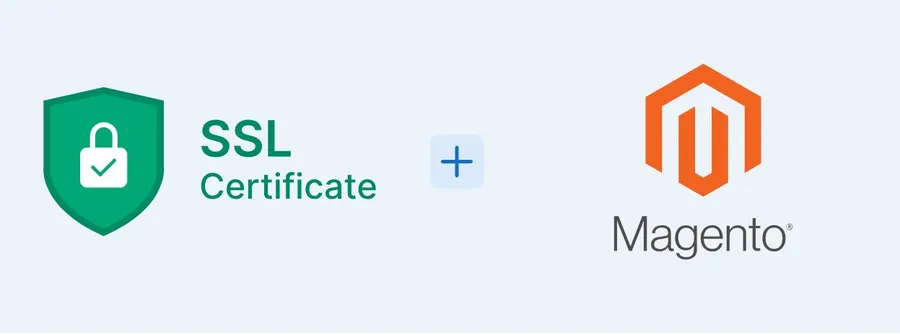
To install and configure SSL for Magento, follow these steps:
- Purchase an SSL certificate from a reputable certificate authority (CA)
- Generate your CSR (Certificate Signing Request)
- Submit your CSR to the CA
- Install your SSL certificate on your Magento server
- Enable SSL for Magento. Once you have installed your SSL certificate, you will need to enable it for Magento: Log in to your Magento admin panel and navigate to Stores > Configuration > General > Web. Then, expand the Base URLs (Secure) section and set the Use Secure URLs on Storefront and Use Secure URLs in Admin settings to Yes. Click Save Config and then clear the Magento cache.
Once SSL is enabled, your store’s URL will change from HTTP to HTTPS. This indicates to customers that your store is secure and that their data is protected.
SSL encryption also has a positive impact on customer trust and SEO rankings. Customers are more likely to shop at stores that use SSL, as they know that their accounts and payment information are secure. Search engines also give preference to websites that use SSL.
Tip 6: Regularly Backup Your Magento Store
Regular backups are essential Magento security tips for data recovery in case of security breaches or other disasters. You should back up your Magento store files and database regularly.
To create automated backups, you can use a Magento backup extension or service. These plugins and tools can be configured to back up your store on a schedule or demand.
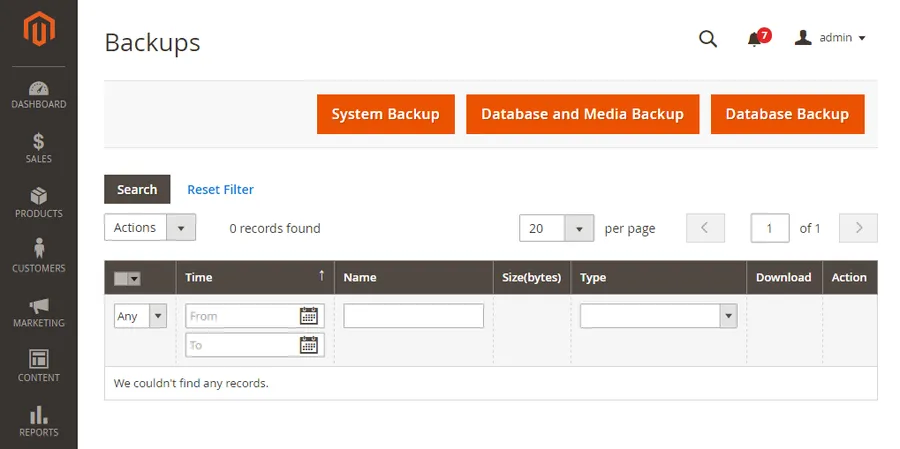
Once you have created a backup, you should store it in a safe location, such as an offsite server or cloud storage service.
Tip 7: Monitor and Audit Your Magento Store
Real-time monitoring and regular security audits can help you identify and address security threats before they cause damage.
There are some Magento security extensions and services that can be used for monitoring and auditing. These plugins and tools can scan your store for vulnerabilities, monitor security logs, and generate audit trails.
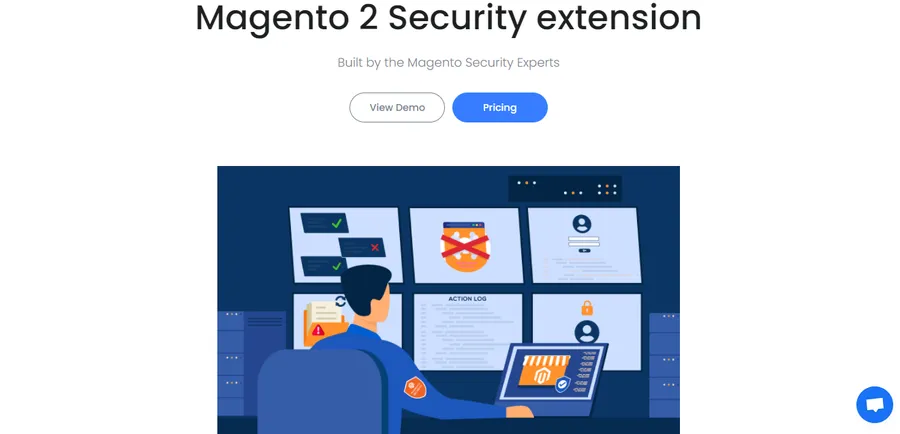
You should regularly review your security logs and audit trails for any suspicious activity. If you identify any potential security threats, you should take immediate action to address them. This is among the eCommerce security best practices.
Tip 8: Educate Your Team and Customers
Employee and customer awareness is one of the other Magento security tips.
Employees should be trained to identify and report suspicious activity, and customers should be educated about secure online shopping practices.
Resources and training materials for educating staff and customers:
- Magento offers many security resources for employees and customers, including security guides, training videos, and awareness campaigns.
- There are also some third-party resources available, such as online courses and webinars.
Promoting secure practices among customers:
- Encourage customers to use strong passwords and enable 2FA.
- Educate customers about the dangers of phishing attacks and malware.
- Advise customers to only shop on secure websites (those that use HTTPS).
Tip 9: Regularly Update and Patch Extensions
Outdated Magento extensions can pose a significant Magento store security risk. Attackers can exploit vulnerabilities in outdated extensions to gain access to your store and data.
Risks associated with outdated extensions and plugins:
- Outdated extensions may contain security vulnerabilities that can be exploited by attackers.
- Outdated extensions may not be compatible with the latest version of Magento, which can lead to security issues.
Guidelines on how to update and patch Magento extensions securely:
- Only download extensions from trusted sources, such as the Magento Marketplace.
- Back up your store files and database before updating any extensions.
- Test new extensions in a staging environment before deploying them to your live store.
- Disable unused extensions to reduce the attack surface.
- Keep your extensions up to date with the latest security patches.
Impact of third-party Magento extensions on overall store security:
Third-party extensions can have a significant impact on overall store security. If an extension is not properly developed or maintained, it could introduce vulnerabilities to your store. It is important to carefully review all third-party extensions before installing them and to only install extensions from trusted sources. You should try these must-have Magento 2 extensions for success.
Tip 10: Prepare a Security Incident Response Plan
A security incident response plan (SIRP) is a document that outlines the steps that your organization will take in the event of a security breach.
A well-crafted SIRP can help you minimize damage and recover quickly from a security incident.
The importance of having a clear response plan in case of security incidents:
- A SIRP can help you quickly and effectively respond to a security breach, which can minimize damage to your business.
- A SIRP can help you communicate the incident to stakeholders and recover from it quickly and efficiently.
Templates or guidelines for creating a security incident response plan:
- Identify and assess the threat. What type of security incident has occurred? What data is at risk? What is the impact on your business?
- Contain the threat. Isolate the affected systems and data to prevent the attacker from spreading laterally or causing further damage.
- Eradicate the threat. Remove the attacker from your systems and remove any malware that has been installed.
- Recover from the incident. Restore affected systems and data from backups.
- Communicate and learn. Communicate the incident to stakeholders and learn from it to improve your security posture.
Steps to take during and after a security breach to minimize damage:
- Notify customers and stakeholders immediately.
- Change all passwords.
- Monitor your systems for suspicious activity.
- Review your security logs and audit trails.
- Implement additional security measures, if necessary.
Final Thoughts
We hope that you have found this blog post helpful and informative. Magento security is a crucial aspect of running a successful online store, and it requires constant attention and care. By following these 10 Magento security tips, you can protect your store from hackers and cyberattacks and provide a safe and reliable shopping experience for your customers.
Don’t forget to check out Claue from ArrowTheme! Claue is a beautiful and responsive Magento theme that will make your store look great on all devices, including smartphones and tablets.
Read More: 20+ Best Magento Development Companies To Elevate Your eCommerce
Contact US | ThimPress:
Website: https://thimpress.com/
Fanpage: https://www.facebook.com/ThimPress
YouTube: https://www.youtube.com/c/ThimPressDesign
Twitter (X): https://x.com/thimpress_com



